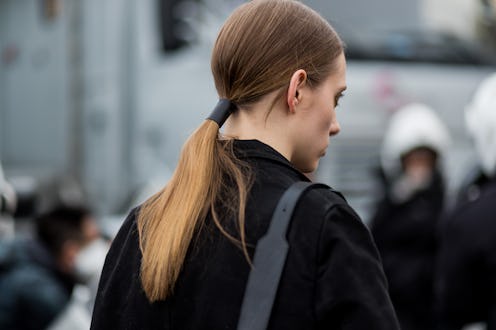(Hair)
Here's Why Silicones In Haircare Spark So Much Debate

Researching silicones on the internet is a bit like falling down a rabbit hole. The ingredient is found in everything from beauty products to reusable straws — but silicones in haircare specifically often inspire the most intense debates. "Chances are if you love how a moisturizer or styling product made your skin and hair feel, it contains one or more silicones," Bryan Barron, Director of Skincare Research for Paula’s Choice, tells TZR over email. "These inert ingredients are the unsung heroes of many lotions and potions people love using because they make skin and hair feel so silky, smooth, and many silicones can do so without adding a heavy, greasy feel."
So, then, why are more and more haircare brands (and shoppers) opting to go silicone-free? Marie Mignon, the director of R&D at Prose — a haircare brand that offers both silicone and silicone-free options — cites three reasons silicones “raise concerns.” First being that silicones are not biodegradable. Second, low-quality silicones can accumulate on your hair, causing build up. And, lastly, “Not all hair types can handle the amount of silicones found in mass-produced, traditional haircare products, causing greasiness/oily hair," says Mignon.
Which may lead you to wonder where this mysterious ingredient even comes from. "Silicones are synthetic materials derived from sand. They contain element silicon and oxygen, and usually some carbon and hydrogen," Perry Romanowski, an independent cosmetic chemist, says over email. And this is a key factor in the solubility of silicones, too: "The difference is in the molecular structure. Ones that are soluble in water typically have an -OH group (oxygen/hydrogen) while ones that are not soluble have only -CH3 groups (methyl groups)."
And solubility is at the heart of the great silicone debate. "There are two types of silicones — soluble and insoluble silicones. Insoluble silicones are heavier and coat the hair, preventing moisture from penetrating the hair shaft, causing damage and dry hair over time," Reni Karnoto, colorist at Antonio Prieto Salon, explains in an email. "Soluble silicones are lighter and break down with water."
Moreover, silicones are often equated to band-aids, since the ingredient itself doesn't penetrate the hair. "They coat the surface in an effort to increase the hydrophobicity, which will help the hair return to its normal state," Mignon explains. "As a result of this 'band-aid' effect, silicones are not permanent and won’t sit on the hair forever; they are typically washed out during the next shampoo cycle."
However, that doesn't necessarily mean you need to stop using a go-to product if it happens to feature them. "If you routinely use insoluble silicones in your hair, you simply need to wash your hair once or twice per week with a non-conditioning shampoo designed to remove product buildup. These work perfectly to cut through the insoluble silicones, allowing them to be rinsed from hair," Barron explains. ("I can usually tell when a client is an avid silicone haircare product user versus ones who don’t; especially if they don’t clarify the hair," Karnoto adds.)
And if you're looking for definitive proof on if you need to cut out silicones from your haircare routine, you need to start looking at your hair itself. "There isn’t a strong reason to do so other than one’s personal preference; some people find their hair looks better with silicone-free products, so you’d need to experiment to see if this is true for you, too," Barron adds.
Ready to conduct a trial for yourself? Below, a few silicone-free haircare products to consider.
This article was originally published on